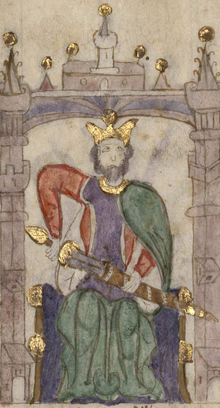Sancho II of Castile and León
| Sancho II | |
|---|---|

Early-14th century miniature of Sancho II of Castile from the Compendio de crónicas de reyes del Antiguo Testamento, gentiles, cónsules y emperadores romanos, reyes godos y de los reinos de Castilla, Aragón, Navarra y Portugal. Located at Biblioteca Nacional de España.
|
|
| King of Castile | |
| Reign | 1065–1072 |
| Predecessor | Ferdinand I |
| Successor | Alfonso VI |
| King of León | |
| Reign | 1072 |
| Coronation | 12 January 1072 (León) |
| Predecessor | Alfonso VI |
| Successor | Alfonso VI |
| King of Galicia | |
| Reign | 1071–1072 |
| Predecessor | García II |
| Successor | Alfonso VI |
| Born | c. 1036/1038 Zamora |
| Died | 6 October 1072 (aged 33–36) Zamora |
| Burial | San Salvador de Oña |
| Consort | Alberta |
| Dynasty | Jiménez |
| Father | Ferdinand I of León and Castile |
| Mother | Sancha of León |
| Religion | Roman Catholicism |
Sancho II (1036/8 – 7 October 1072), called the Strong (el Fuerte), was King of Castile (1065–72), Galicia (1071–72) and León (1072).
Born at Zamora, Sancho was the eldest son of Ferdinand the Great and Sancha of León. He was married to Alberta, a possible daughter of William I, king of England.
After Ferdinand the Great defeated and killed his wife's brother in battle, Ferdinand was crowned King of León and Castile and called himself Imperator totius Hispaniae ("Emperor of all Spain").
When the kingdom was divided following Ferdinand's death in 1065, Sancho succeeded his father as King of Castile, while Sancho's younger brother Alfonso become King of León and his youngest brother García became King of the reestablished Kingdom of Galicia (partitioned from León). Each of the brothers was also assigned a sphere of influence among the Taifa states.
Ferdinand also granted some holdings to his two daughters, giving Urraca control of the city of Zamora and Elvira the city of Toro, both enclaved within Alfonso's Kingdom of León.
In 1068, Sancho defeated his cousins Sancho IV of Navarre and Sancho of Aragon in the War of the Three Sanchos. This expanded his Kingdom of Castile with the reconquered land of Bureba, Alta Rioja, and Álava, which his father had given to Sancho IV's father, García, for his support in defeating Bermudo III of León.
...
Wikipedia
